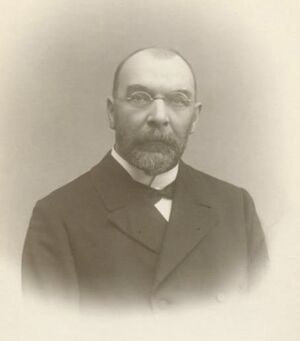Stepan Smolensky
Choirmaster and Russian church music historian (b. 8/20 October 1848 in Kazan; d. 20 July/2 August 1909 in Vasilsursk), born Stepan Vasilyevich Smolensky (Степан Васильевич Смоленский).
After graduating from the law and philology departments at Kazan University, Smolensky then taught at the city's teacher seminary. In 1889, he moved to Moscow to take up the post of director of the Synodal School (which trained choristers for the Russian Orthodox church services and was also a boarding-school for those pupils who enrolled at the age of 7 or 8), as well as becoming a professor at the Moscow Conservatory. The Synodal Choir was reputed to be one of the best in the world, and although at its public appearances (mostly in the Cathedral of the Dormition) it was only permitted to sing Russian Orthodox sacred music, the choir did study non-Orthodox works, too (including the masses of Palestrina and Mozart), but could only perform these at private concerts. Quite often when Tchaikovsky happened to be in Moscow, Smolensky would organize such concerts for him [1]. From 1901 to 1903 Smolensky directed the Imperial Chapel Choir in Saint Petersburg.
Correspondence with Tchaikovsky
4 letters from Tchaikovsky to Stepan Smolensky have survived, dating from 1892 and 1893, all of which have been translated into English on this website:
- Letter 4763 – 1/13 September 1892, from Moscow
- Letter 4887 – 8/20 March 1893, from Moscow
- Letter 4911 – 5/17 April 1893, from Klin
- Letter 4913a – 11/23 April 1893, from Klin
4 letters from Smolensky to the composer, dating from 1892 and 1893, are preserved in the Tchaikovsky State Memorial Musical Museum-Reserve at Klin (a4, Nos. 4051–4054).
Bibliography
- С. Смоленский. Энтузиаст русской хоровой культуры (1959)
- Неизвестные письма Чайковского из фондов Российской национальной библиотеки (2003)
External Links
Notes and References
- ↑ See the memoirs by the pianist and teacher Aleksandr Goldenweiser (1875–1961), who was then a student at the Moscow Conservatory, in Воспоминания о П. И. Чайковском (1980), p. 314–315. A shorter extract is also included in Tchaikovsky remembered (1993), p. 169.

